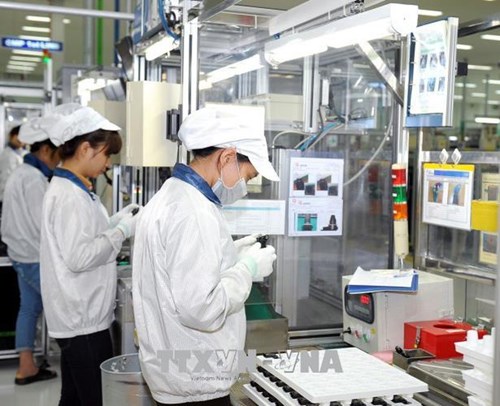Korean investment in Vietnam has been a success story. The RoK remains by far the largest foreign investor in Vietnam, having registered to pour USD 65 billion into 7,080 foreign direct investment (FDI) projects in Vietnam as of the end of July.
The FDI from the RoK has been a huge boon to Vietnam’s economic growth as well as the country’s industrialization and modernization.
    |
 |
|
Korean investment in Vietnam has been a success story. |
The RoK’s significant position in the Vietnamese economy is a result of long-standing bilateral commercial relations.
Korean FDI came to Vietnam in three waves, according to the Korea Trade Investment Promotion Agency (KOTRA). Following the establishment of diplomatic ties between the two countries in 1992, Vietnam experienced a first wave of Korean investment with large construction firms like Posco and Daewoo being pioneers.
The second wave started in the early 2000s after the signing of the US-Vietnam Bilateral Trade Agreement and Vietnam’s accession to the World Trade Organization (WTO), characterized by increased investment in garment and textile manufacturing.
Most recently, the third wave focused on electronic and consumer goods with Samsung Electronics being the biggest Korean investor in Vietnam. More than 73 percent of Korean FDI firms in the country operate in service of the local market. Many of them hold key roles in spearhead sectors, such as electronics, energy, automobile, construction and garment and textiles.
Big Korean corporations have headed for northern Vietnam while the south has been favored by the RoK’s small and medium-sized enterprises. The central region has been a destination for FDI in tourism as a large number of Korean tourists travel to central cities and provinces, particularly Da Nang.
Last year, the RoK’s registered FDI in Vietnam reached a record high of more than USD 9 billion, landing in major projects in manufacturing, real estate, energy, distribution and M&A.
According to economists, Korean firms favor Vietnam as a destination for FDI for seven reasons. First, Vietnam remains competitive over other regional FDI destinations because of a large pool of cheap laborers who are viewed by Korean firms as hard-working, driving down production costs.
Second, Korean investors have been attracted by the local market of more than 96.6 million people, an expanding middle class and young population as well as a relatively fast-growing economy.
Third, the political stability compared with other emerging economies in the region is attractive, boosting confidence in doing business in the Southeast Asian country.
Fourth, the RoK government has shifted focus on growing ties with India and Southeast Asia, highlighted by the latest “New Southern Policy” adopted by the administration of President Moon Jae-in. The policy is expected to help the RoK diversify partnerships in addition to its traditional reliance on the US and China, who have been involved in an increasing trade war, harming Asia’s fourth biggest economy.
Fifth, the strong FDI flows from the RoK resulted from Vietnam’s activeness in opening the local economy with administrative reforms and tariff incentives.
Sixth, many Korean companies have been shifting away from China, following China’s opposition to the RoK deploying the US Terminal High Altitude Area Defense (THAAD) missile system. According to the Association of High Potential Enterprises of Korea (AHPEK), the number of Korean FDI projects and investment in China has seen a sharp fall since 2016 as Korean investors are moving to Vietnam.
Lastly, the Vietnam-RoK Free Trade Agreement, which took effect at the end of 2015, has bolstered the two countries’ trade relations. Bilateral trade ties are also set to grow thanks to the positive effect of other FTAs being negotiated or concluded by Vietnam, such as the EU-Vietnam FTA (EVFTA) and the Regional Comprehensive Economic Partnership (RECEP).
Vietnam is emerging as a regional commercial hub, with a favorable location, making it easier for Korean companies to get access to the Southeast Asian markets.
Vietnam is set to welcome more Korean investment thanks to efforts by several Vietnamese cities and provinces to promote their potential and seek links with Korean firms. Furthermore, the country has a lot more to offer in manufacturing, infrastructure development, energy, finance, pharmaceuticals, information technology, wholesale and retail, logistics and others, also areas that the RoK has advantages in. Experts from KOTRA believe that Korean FDI in these sectors would bring benefits for both sides.
Korean enterprises are looking forward to more support from the Government of Vietnam in improving information transparency, reducing public administration burden and fighting commercial fraud to better smooth their way to the local market.
Source: VNA